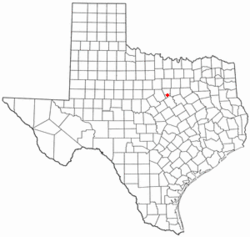Glen Rose, Texas
| Glen Rose, Texas | |
|---|---|
| City | |

Downtown Glen Rose, in 2005
|
|
 Location of Glen Rose, Texas |
|
 |
|
| Coordinates: 32°14′12″N 97°45′14″W / 32.23667°N 97.75389°WCoordinates: 32°14′12″N 97°45′14″W / 32.23667°N 97.75389°W | |
| Country | United States |
| State | Texas |
| County | Somervell |
| Area | |
| • Total | 2.7 sq mi (7.1 km2) |
| • Land | 2.7 sq mi (7.1 km2) |
| • Water | 0.0 sq mi (0.0 km2) |
| Elevation | 620 ft (189 m) |
| Population (2013) | |
| • Total | 2,536 |
| • Density | 940/sq mi (360/km2) |
| Time zone | Central (CST) (UTC-6) |
| • Summer (DST) | CDT (UTC-5) |
| ZIP code | 76043 |
| Area code(s) | 254 (exchanges 897 and 898) |
| FIPS code | 48-29876 |
| GNIS feature ID | 1373854 |
| Website | City Website |
Glen Rose is a city in and the county seat of Somervell County, Texas, United States. As of the 2012 census estimate, the city population was 2,502.
The area was first settled in 1849 by Charles Barnard, who opened a trading post near Comanche Peak. After the region became a federal Indian reservation in 1855, Barnard moved his business to Fort Belknap. Circa 1859 when the reservation was abolished, he returned to the area and built the first store on what is now the site of Glen Rose.
A three-story stone gristmill was constructed along the Paluxy River and the town that grew up around it became known as Barnard's Mill. The mill was sold to T.C. Jordan of Dallas in 1871 for $65,000. Jordan's wife, a native of Scotland, decided to rename the town Rose Glen to reflect the area's natural surroundings. The citizens later voted to call the community Glen Rose. A post office opened in 1874.
When Somervell County was formed on March 15, 1875, Glen Rose was designated as its county seat. A Baptist college was organized in 1879 and was later sold to the Paluxy Baptist Association. In 1889, the northern Presbyterians opened Glen Rose Collegiate Institute (also known as Glen Rose College), which remained in operation for the next 15 to 20 years. A courthouse around Glen Rose's town square was completed around 1892, but burned down a year later. A newly built Romanesque Revival style courthouse was constructed soon after with locally quarried limestone. That building sustained damage in a 1902 tornado that also damaged part of the town square.
Throughout the period from the 1900s to the 1920s, Glen Rose was home to approximately 1,000 people. The area's mineral springs attracted numerous doctors and self-styled healers to the community. During Prohibition, the area was a center of moonshining and Glen Rose became known as the "whiskey woods capital of the state." The population remained steady during the Great Depression, although unemployment rates in both Glen Rose and Somervell County increased. As part of the New Deal, Glen Rose borrowed $80,000 under the Public Works Administration (PWA) to construct a new water and sewage system. Three low-water dams on the Paluxy River, several local school buildings, and a canning plant were built with Works Projects Administration (WPA) money.
...
Wikipedia
